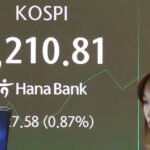
New York-based Apollo Global Management and London-based Intermediate Capital Group (ICG) have joined the ranks of global private equity firms that have set up offices in Seoul.
South Korea is one of three countries in the Asia-Pacific, alongside Australia and Japan, where Qatar Investment Authority (QIA) has announced it would be bolstering its presence, according to the 2025 Asia Pacific Private Equity Almanac released on Tuesday.
With a growing pool of pension funds and corporate restructuring, South Korea is emerging as a key capital source and investment destination for global alternative investment firms.
In 2024, the country’s M&A market remained solid, with deal values totaling $18.6 billion, ranking third in the Asia-Pacific market.
“Although the deal count saw a decrease to 103 in 2024, down from 122 in 2023, Korea’s dealmaking momentum picked up in the second half of 2024, totaling $12.9 billion in deal value, marking a 68% increase over the same period in 2023,” said Deloitte in the report
Also, PE firms are now playing a more active role in reforming the governance and management of Korean companies, which remain undervalued relative to their asset values.
OPTIMISTIC OUTLOOK
Across the Asia-Pacific, PE investment activity increased throughout 2024, ending with a total of $138 billion of investments, up 8.1% from 2023, according to the report.
It gave an upbeat outlook for the region’s M&A market this year, with lowered interest rates expected to lubricate leveraged buyout deals.
“Deal count (in 2024) did not reach the levels seen in 2021 and 2022. However … there is a growing sense of optimism among GPs and the broader market for a very active 2025,” said Deloitte in the report. GPs are short for general partners.

Business restructuring will be a key driver of M&A activity in South Korea, where companies are unloading non-core assets and even cash cows to buttress their financial health.
POLARIZATION TRENDS
Last year, the Asia-Pacific private equity market saw a clear trend of polarization, with a decline in mid-sized deals, while mega and small-scale transactions dominated.
Over the past decade, the average buyout investment distribution by transaction value remained balanced, with large deals, mid-sized deals and small deals each accounting for roughly one-third of the total.
However, in 2024, the share of large deals rose to 42%, while small deals accounted for 30%, leaving mid-sized deals at just 28%.
In the small-deal segment, bolt-on transactions (acquisitions of similar businesses) have emerged as a key strategy, accounting for 27-31.5% of disclosed deals between 2021 and 2024. This marks a twofold increase compared to the mid-2010s.
“As the Asia-Pacific private equity market gains the spotlight, we’re witnessing trends such as the polarization of deal sizes and shifts in exit strategies, as well as rising interest in the Korean market,” said Nam Sang Wook, private equity leader for Deloitte Korea’s consulting team.
By Da-Eun Choi
max@hankyung.com
Yeonhee Kim edited this article.













